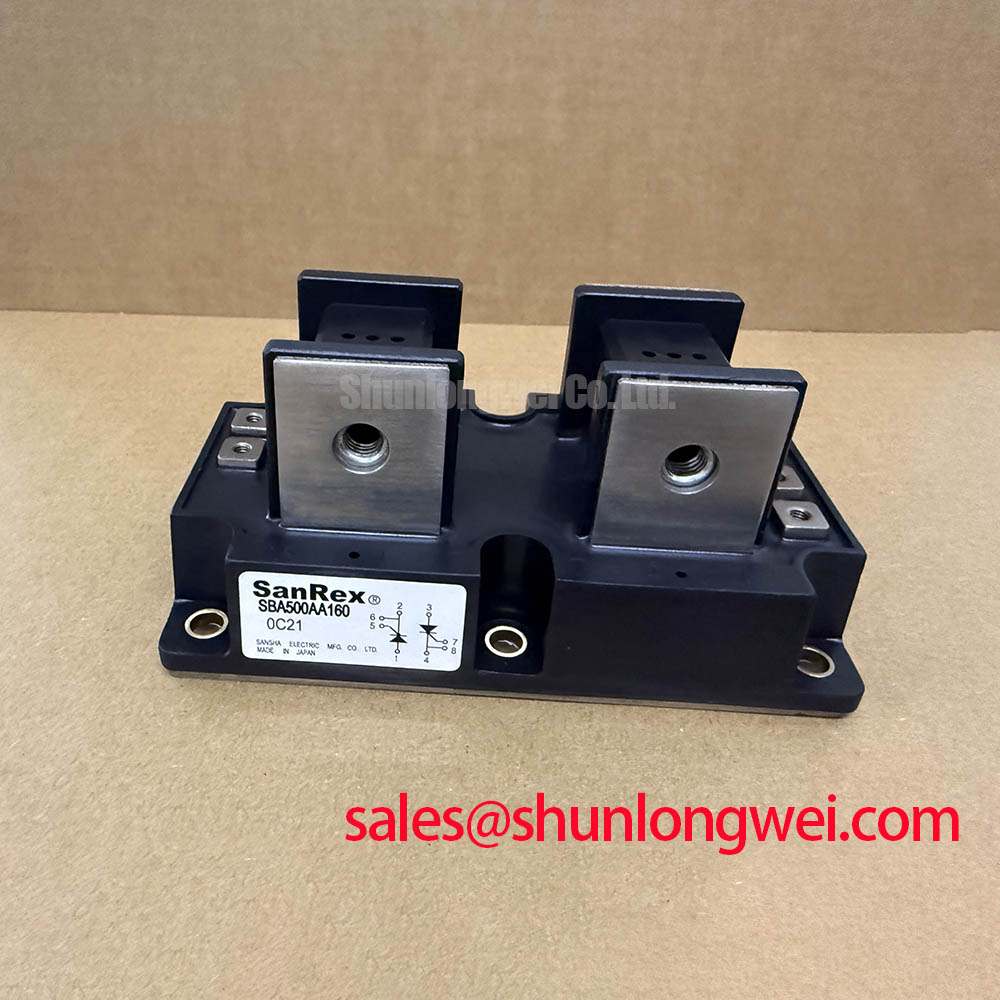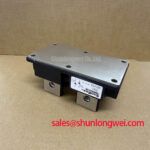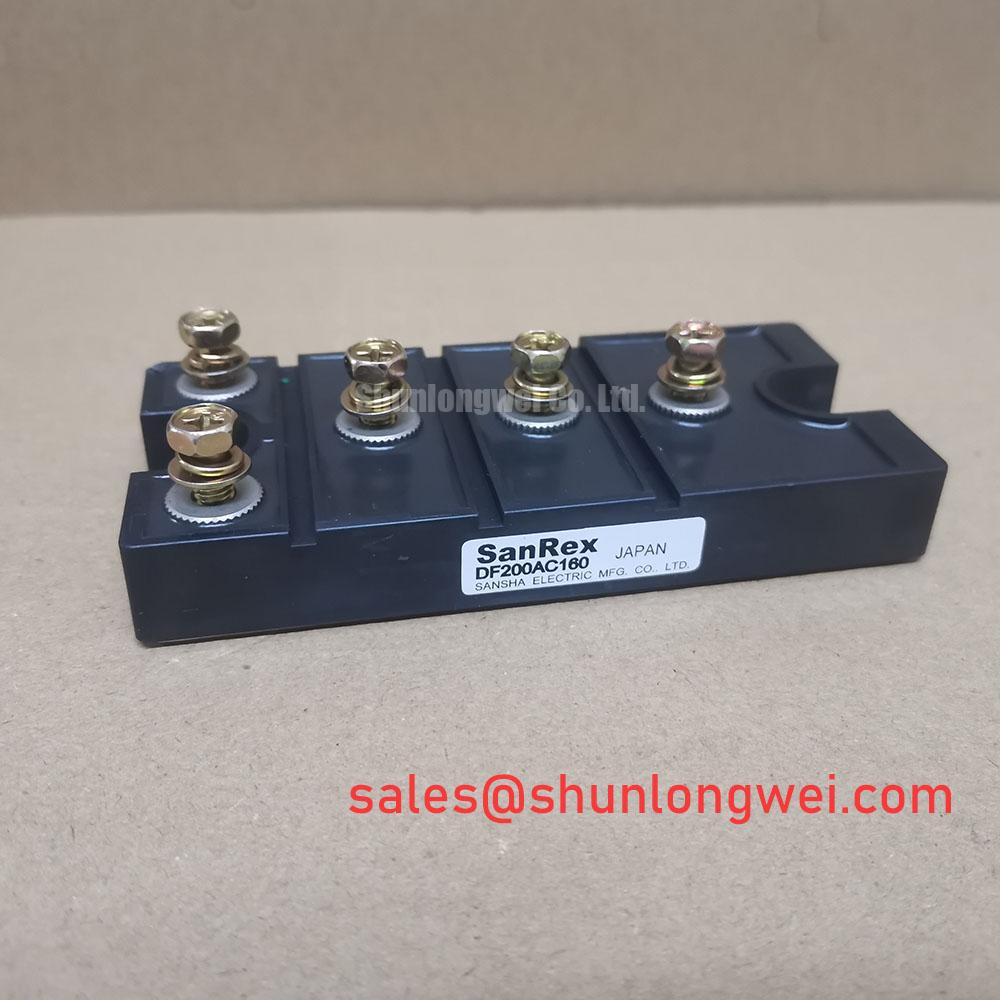Content last revised on November 19, 2025
Sanrex SBA500AA160 Thyristor Module: Engineering Reliability for High-Power Control
Product Overview: SBA500AA160 Power Thyristor Module
Engineered for High-Stress Industrial Power Conversion
The Sanrex SBA500AA160 is a high-power thyristor module designed for exceptional reliability in demanding AC control and rectifier applications. Delivering a robust specification of 1600V | 500A | 0.085 K/W, this module combines high blocking voltage with superior current handling. Its key benefits include exceptional surge survivability and simplified thermal management. This device directly addresses the need for rugged power control components in systems like industrial motor drives, where managing high inrush currents is a primary engineering challenge. For industrial drives operating on 690V lines, the SBA500AA160's 1600V rating provides the necessary safety margin for reliable operation.
Key Parameter Overview
Decoding the Specs for Thermal Stability and Electrical Ruggedness
The technical specifications of the SBA500AA160 are tailored for high-power industrial environments. The parameters are grouped by function to facilitate efficient design evaluation, focusing on the electrical, thermal, and mechanical characteristics that ensure long-term performance.
| Parameter | Symbol | Value | Conditions |
|---|---|---|---|
| Blocking & Voltage Ratings | |||
| Repetitive Peak Off-State Voltage | VDRM | 1600 V | |
| Repetitive Peak Reverse Voltage | VRRM | 1600 V | |
| Isolation Breakdown Voltage | VISO | 2500 V | RMS, AC 1 minute |
| Current & Conduction Ratings | |||
| Average On-State Current | IT(AV) | 500 A | Tc = 66°C |
| Surge On-State Current | ITSM | 10000 A | 60Hz, half-sine wave, non-repetitive |
| Peak On-State Voltage | VTM | 1.45 V | IT = 1500A |
| Thermal & Mechanical Specifications | |||
| Thermal Impedance | Rth(j-c) | 0.085 K/W | Junction to Case |
| Operating Junction Temperature | Tj | -40 to +125 °C | |
Download the SBA500AA160 datasheet for detailed specifications and performance curves.
Application Scenarios & Value
System-Level Benefits in Industrial Control and Conversion
The SBA500AA160 is engineered for applications where precise control of high power is essential for operational integrity and efficiency. Its robust characteristics provide tangible value in demanding industrial systems.
- Industrial Soft Starters: The primary challenge in large motor applications is managing the massive inrush current during startup. The SBA500AA160's exceptional surge current rating (ITSM) of 10kA provides the resilience needed to safely ramp up motor voltage using Phase Angle Control, protecting both the motor and the electrical infrastructure from damaging transients. This high ITSM is like a circuit's safety net, catching the sudden, massive electrical "weight" of a motor starting up without breaking.
- Controlled Bridge Rectifiers: In applications like electroplating or DC motor drives, this module can be used to build reliable and efficient controlled rectifiers. Its 1600V blocking voltage offers a significant safety margin for systems connected to 400V or even 690V industrial grids, ensuring stability against line voltage fluctuations.
- High-Power AC Switches & Heater Control: The module's configuration of two independent thyristors in an isolated package is ideal for constructing static AC switches. The low thermal impedance of 0.085 K/W ensures efficient heat dissipation, allowing for more compact heatsink designs or operation at higher ambient temperatures in applications like industrial furnace control.
For systems requiring a similar voltage rating but with integrated diode components for rectifier applications, the SKKD162/16 offers a thyristor/diode configuration. For very high-power rectifier needs, the MDS500A/1600V provides a complete three-phase bridge solution.
Technical Deep Dive
The Engineering Behind Surge Survivability and Thermal Efficiency
A critical, yet often overlooked, aspect of power module reliability is its ability to handle non-repetitive surge events. The SBA500AA160's 10kA ITSM rating is not just a number; it's a testament to the robust internal construction and large silicon die area designed to absorb and dissipate immense energy pulses without failure. This capability is crucial in a Servo Drive or soft starter, where the initial current can be many times the nominal operating current. The module's I²t rating of 4.16×10⁵ A²s provides a precise metric for engineers to coordinate with upstream fuses, ensuring that the protective devices activate before the thyristor is damaged during a fault. This synergy between surge capacity and thermal design is fundamental to building resilient power systems that minimize unexpected downtime.
Frequently Asked Questions (FAQ)
How does the 10kA surge current rating (ITSM) translate to application reliability?
The high ITSM ensures the SBA500AA160 can survive severe inrush currents common in motor starting or fault conditions. This electrical ruggedness prevents catastrophic failure, enhancing the overall system's field reliability and reducing the likelihood of costly downtime, making it a dependable choice for industrial AC voltage controllers.
What is the main benefit of the 0.085 K/W thermal impedance?
A low Rth(j-c) value signifies highly efficient heat transfer from the silicon chip to the module's baseplate and, subsequently, the heatsink. This allows the device to run cooler under load, which directly increases its operational lifespan and reliability. For designers, it can mean using a smaller, less expensive heatsink or achieving higher power output within the same thermal budget.
Strategic Outlook for High-Power Designs
The Sanrex SBA500AA160 represents a strategic component choice for designers of high-power industrial control systems. Its core design philosophy prioritizes electrical and thermal robustness, addressing the primary failure vectors in demanding applications. By specifying a module with superior surge handling and efficient thermal characteristics, engineering teams can build in a higher degree of system-level resilience from the ground up. This focus on fundamental reliability simplifies protective circuitry, optimizes thermal management, and ultimately contributes to a lower total cost of ownership through enhanced equipment uptime and longevity in the field.












